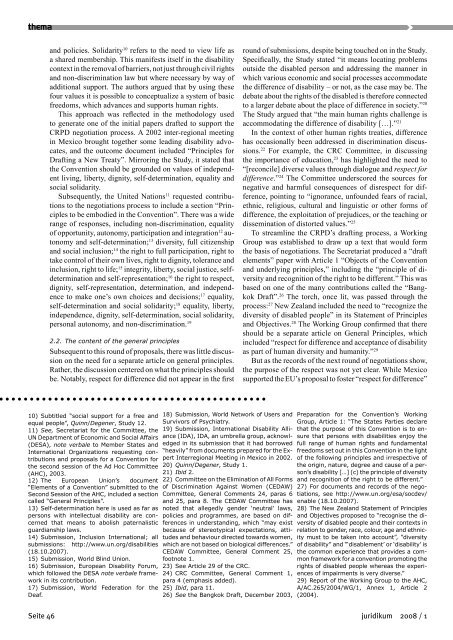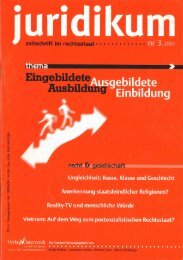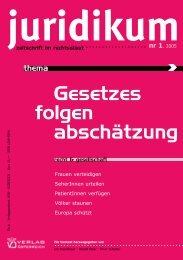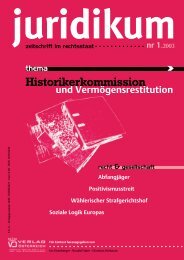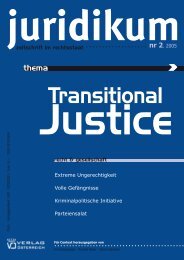Download - juridikum, zeitschrift für kritik | recht | gesellschaft
Download - juridikum, zeitschrift für kritik | recht | gesellschaft
Download - juridikum, zeitschrift für kritik | recht | gesellschaft
Erfolgreiche ePaper selbst erstellen
Machen Sie aus Ihren PDF Publikationen ein blätterbares Flipbook mit unserer einzigartigen Google optimierten e-Paper Software.
thema<br />
and policies. Solidarity 10 refers to the need to view life as<br />
a shared membership. This manifests itself in the disability<br />
context in the removal of barriers, not just through civil rights<br />
and non-discrimination law but where necessary by way of<br />
additional support. The authors argued that by using these<br />
four values it is possible to conceptualize a system of basic<br />
freedoms, which advances and supports human rights.<br />
This approach was reflected in the methodology used<br />
to generate one of the initial papers drafted to support the<br />
CRPD negotiation process. A 2002 inter-regional meeting<br />
in Mexico brought together some leading disability advocates,<br />
and the outcome document included “Principles for<br />
Drafting a New Treaty”. Mirroring the Study, it stated that<br />
the Convention should be grounded on values of independent<br />
living, liberty, dignity, self-determination, equality and<br />
social solidarity.<br />
Subsequently, the United Nations 11 requested contributions<br />
to the negotiations process to include a section “Principles<br />
to be embodied in the Convention”. There was a wide<br />
range of responses, including non-discrimination, equality<br />
of opportunity, autonomy, participation and integration 12 autonomy<br />
and self-determination; 13 diversity, full citizenship<br />
and social inclusion; 14 the right to full participation, right to<br />
take control of their own lives, right to dignity, tolerance and<br />
inclusion, right to life; 15 integrity, liberty, social justice, selfdetermination<br />
and self-representation; 16 the right to respect,<br />
dignity, self-representation, determination, and independence<br />
to make one’s own choices and decisions; 17 equality,<br />
self-determination and social solidarity; 18 equality, liberty,<br />
independence, dignity, self-determination, social solidarity,<br />
personal autonomy, and non-discrimination. 19<br />
2.2. The content of the general principles<br />
Subsequent to this round of proposals, there was little discussion<br />
on the need for a separate article on general principles.<br />
Rather, the discussion centered on what the principles should<br />
be. Notably, respect for difference did not appear in the first<br />
round of submissions, despite being touched on in the Study.<br />
Specifically, the Study stated “it means locating problems<br />
outside the disabled person and addressing the manner in<br />
which various economic and social processes accommodate<br />
the difference of disability – or not, as the case may be. The<br />
debate about the rights of the disabled is therefore connected<br />
to a larger debate about the place of difference in society.” 20<br />
The Study argued that “the main human rights challenge is<br />
accommodating the difference of disability […].” 21<br />
In the context of other human rights treaties, difference<br />
has occasionally been addressed in discrimination discussions.<br />
22 For example, the CRC Committee, in discussing<br />
the importance of education, 23 has highlighted the need to<br />
“[reconcile] diverse values through dialogue and respect for<br />
difference.” 24 The Committee underscored the sources for<br />
negative and harmful consequences of disrespect for difference,<br />
pointing to “ignorance, unfounded fears of racial,<br />
ethnic, religious, cultural and linguistic or other forms of<br />
difference, the exploitation of prejudices, or the teaching or<br />
dissemination of distorted values.” 25<br />
To streamline the CRPD’s drafting process, a Working<br />
Group was established to draw up a text that would form<br />
the basis of negotiations. The Secretariat produced a “draft<br />
elements” paper with Article 1 “Objects of the Convention<br />
and underlying principles,” including the “principle of diversity<br />
and recognition of the right to be different.” This was<br />
based on one of the many contributions called the “Bangkok<br />
Draft”. 26 The torch, once lit, was passed through the<br />
process: 27 New Zealand included the need to “recognize the<br />
diversity of disabled people” in its Statement of Principles<br />
and Objectives. 28 The Working Group confirmed that there<br />
should be a separate article on General Principles, which<br />
included “respect for difference and acceptance of disability<br />
as part of human diversity and humanity.” 29<br />
But as the records of the next round of negotiations show,<br />
the purpose of the respect was not yet clear. While Mexico<br />
supported the EU’s proposal to foster “respect for difference”<br />
10) Subtitled “social support for a free and<br />
equal people”, Quinn/Degener, Study 12.<br />
11) See, Secretariat for the Committee, the<br />
UN Department of Economic and Social Affairs<br />
(DESA), note verbale to Member States and<br />
International Organizations requesting contributions<br />
and proposals for a Convention for<br />
the second session of the Ad Hoc Committee<br />
(AHC), 2003.<br />
12) The European Union’s document<br />
“Elements of a Convention” submitted to the<br />
Second Session of the AHC, included a section<br />
called “General Principles”.<br />
13) Self-determination here is used as far as<br />
persons with intellectual disability are concerned<br />
that means to abolish paternalistic<br />
guardianship laws.<br />
14) Submission, Inclusion International; all<br />
submissions: http://www.un.org/disabilities<br />
(18.10.2007).<br />
15) Submission, World Blind Union.<br />
16) Submission, European Disability Forum,<br />
which followed the DESA note verbale framework<br />
in its contribution.<br />
17) Submission, World Federation for the<br />
Deaf.<br />
18) Submission, World Network of Users and<br />
Survivors of Psychiatry.<br />
19) Submission, International Disability Alliance<br />
(IDA), IDA, an umbrella group, acknowledged<br />
in its submission that it had borrowed<br />
“heavily” from documents prepared for the Expert<br />
Interregional Meeting in Mexico in 2002.<br />
20) Quinn/Degener, Study 1.<br />
21) Ibid 2.<br />
22) Committee on the Elimination of All Forms<br />
of Discrimination Against Women (CEDAW)<br />
Committee, General Comments 24, paras 6<br />
and 25, para 8. The CEDAW Committee has<br />
noted that allegedly gender ‘neutral’ laws,<br />
policies and programmes, are based on differences<br />
in understanding, which “may exist<br />
because of stereotypical expectations, attitudes<br />
and behaviour directed towards women,<br />
which are not based on biological differences.”<br />
CEDAW Committee, General Comment 25,<br />
footnote 1.<br />
23) See Article 29 of the CRC.<br />
24) CRC Committee, General Comment 1,<br />
para 4 (emphasis added).<br />
25) Ibid, para 11.<br />
26) See the Bangkok Draft, December 2003,<br />
Preparation for the Convention’s Working<br />
Group, Article 1: “The States Parties declare<br />
that the purpose of this Convention is to ensure<br />
that persons with disabilities enjoy the<br />
full range of human rights and fundamental<br />
freedoms set out in this Convention in the light<br />
of the following principles and irrespective of<br />
the origin, nature, degree and cause of a person’s<br />
disability […] (c) the principle of diversity<br />
and recognition of the right to be different.”<br />
27) For documents and records of the negotiations,<br />
see http://www.un.org/esa/socdev/<br />
enable (18.10.2007).<br />
28) The New Zealand Statement of Principles<br />
and Objectives proposed to “recognise the diversity<br />
of disabled people and their contexts in<br />
relation to gender, race, colour, age and ethnicity<br />
must to be taken into account”, ”diversity<br />
of disability” and “‘disablement’ or ‘disability’ is<br />
the common experience that provides a common<br />
framework for a convention promoting the<br />
rights of disabled people whereas the experiences<br />
of impairments is very diverse.”<br />
29) Report of the Working Group to the AHC,<br />
A/AC.265/2004/WG/1, Annex 1, Article 2<br />
(2004).<br />
Seite 46 <strong>juridikum</strong> 2008 / 1


